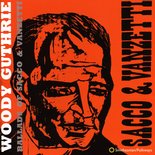 Nicola Sacco and Bartolomeo Vanzetti, Italian anarchists in Massachusetts, were framed with murdering a guard and paymaster at a shoe factory and for allegedly stealing over $15,000. They were electrocuted in 1927. The judge that convicted them described the pair as "anarchic bastards." Their execution caused unrest and outcry across the globe.
Nicola Sacco and Bartolomeo Vanzetti, Italian anarchists in Massachusetts, were framed with murdering a guard and paymaster at a shoe factory and for allegedly stealing over $15,000. They were electrocuted in 1927. The judge that convicted them described the pair as "anarchic bastards." Their execution caused unrest and outcry across the globe. On Ballads of Sacco and Vanzetti, Woody Guthrie champions their politics (they led labor strikes and participated in the anti-war movement) and decries the system that put them to death. On "I Just Want to Sing Your Name", Woody does just that. He sings their names with tremendous emotion, illustrating his appreciation for the pair and his immense sorrow at their fate. Other songs develop the story, with the opener "The Flood and the Storm" laying out the historical backdrop of the story. World War I has ended and in the following economic boom in the states "a few got richer, and richer, and richer but the poor folk got poorer."
Remarkably, this is the first Woody Guthrie album I've heard. Upon hearing it, I've realized to what extent Bob Dylan imitated Guthrie in the early 1960s. Much of the guitar picking on The Freewheelin' Bob Dylan is directly traceable to Guthrie's style. The melodies and vocal habits of Guthrie also turn up in Dylan. Guthrie half-laughs in the midst of some lyrics, a trait that Dylan emulates often.
Today, Guthrie's music will probably garner comparisons to the explosion of bluegrass following the release of the O Brother, Where Art Thou? soundtrack. Unsuspecting listeners engaged by the folksy guitar and old-time country voice, however, might be caught off guard by the words. Guthrie doesn't waste a single line on this album with musings on love or traveling- every word is devoted to the story of Sacco and Vanzetti.
Guthrie's skill is storytelling through his tunes. Over the course of these songs, characters are developed. He gets you to despise the villains, including Judge Thayer and Eva Splaine, who "sent these men to the chair." In "You Souls of Boston", Guthrie sings:
One lady by the name of Eva Splaine saw the robbers jump in their car and drive away. For a second and a half she seen this speeding car,she swore Sacco was the bandit man. It was twenty, or thirty, or fifty more, said Sacco was not in the robber's car. Judge Webster Thayer stuck by Eva Splaine, said Sacco was the guilty man.
His delivery evokes a friendly conspiracy between Thayer and Splaine. One can't help but be appalled by the villainy of these characters.
Guthrie develops other characters as pour souls left behind by progress and villanized by the state. We deeply feel for these characters. On "Suassos Lane", Guthrie sings, after explaining the multiple alibis of Sacco and Vanzetti:
I tell you workin' people fight hard for higher wages, fight to kill blackmarket prices, this is why you take my life. I tell you workin' people, fight hard for cleaner houses, fight hard for the wife and children. That's why they took my life.
The final song on Ballads of Sacco and Vanzetti, "Sacco's Letter to His Son", is played by Pete Seeger. According to Wikipedia, the words were actually composed by Nicola Sacco. Seeger beautifully delivers his words, which, if nothing else can, exhibit the goodness in Sacco's heart.
Imagine if albums like Ballads of Sacco and Vanzetti were recorded by today's popular artists. Maybe we'd see Ballads of Murat Kurnaz. A German citizen who was arrested in Pakistan after September 11th, Murat Kurnaz is now detained at Guantanamo Bay. Amnesty International believes that the evidence against him is weak, and his innocence is likely. They call for an immediate fair trial or release. No one is writing songs on his behalf.






No comments:
Post a Comment